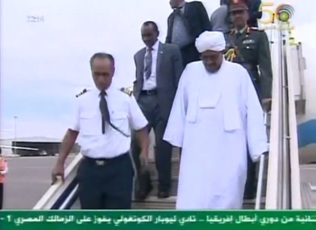Sudan acknowledges strain in relations with “friendly” nations
March 23, 2014 (KHARTOUM) – The Sudanese ministry of foreign affairs has admitted that there are tensions in Khartoum’s relations with some “friendly” countries, but stressed that this only a temporary situation.

He stressed Sudan’s keenness to build strong relations with countries based on mutual respect and interests of the people, adding that Khartoum had adopted a balanced foreign policy.
“Our foreign policy is not [another] one’s axis or against anyone and what we care about is the interests of our citizens and our neighbours,” Ismail said.
“We are not working to threaten anyone and on the other hand we do not accept that anyone threatens us,” he added.
Although the Sudanese official did not name the countries, he was likely referring to Saudi Arabia.
Saudi Arabian and some European banks have reportedly suspended their dealings with Sudan as of the 28 February.
Sudanese finance minister Badr al-Deen Mahmoud said at the time that two Saudi banks have suspended their financial transactions with Sudan, describing banking interactions particularly with the Arab countries as crucial because it links Khartoum to the international banking system.
He blamed the move on pressure by the United States, which has imposed economic sanctions on Sudan since 1997.
The ruling party’s (NCP) head of external relations, al-Dirdeeri Mohamed Ahmed, who was asked about the Saudi move late last month said that while tensions exist in their ties, efforts are underway to reverse this trend.
“There is so much that is being done now, both public and non-public, to bring things back to their original state,” the NCP official was quoted as saying by the al-Taghyeer online news portal.
Ahmed rejected using the term blockade to describe Saudi Arabia’s decision, stating that the Arab Gulf nation “does not embargo Sudan”.
A Western diplomat told Agence France Presse (AFP) that the move by the European banks appears to reflect an increasingly cautious attitude by financial institutions which do not want to risk being found in violation of US sanctions.
For Saudi Arabia, strained political relations over Sudan’s links to Iran could be a factor in the banks’ decision, the Western diplomat said.
Over the past few years there have been mounting signs of deterioration in relations between Khartoum and Riyadh.
Last August, Saudi Arabia closed its airspace to the plane carrying Sudanese president Omer Hassan al-Bashir on his way to Iran where he was scheduled to attend the inauguration ceremony of president-elect Hassan Rouhani, thus forcing him and his delegation to return home.
Observers speculated that Sudan’s growing ties with Iran could have irked the Saudis, prompting them to block Bashir’s flight.
Sudan has also allowed Iranian warships to dock in Port Sudan three times over the past year-and-a-half, drawing concern by the US and its allies in the Gulf.
The mostly Sunni Muslim Arab Gulf states are wary of Iranian influence in the Middle East, fearing the Shiite-led country is seeking regional dominance that will stir sectarian tensions.
The Syrian conflict has also increased the divide between the two sides, with Arab monarchies supporting the rebels and Iran backing the Al-Assad regime.
Bashir, who performed the Muslim Hajj (pilgrimage) last year, did not meet with King Abdullah bin Abdulaziz during the visit, despite the Saudi monarch holding separate talks with the Turkish and Pakistani presidents who also performed Hajj this year.
(ST)
